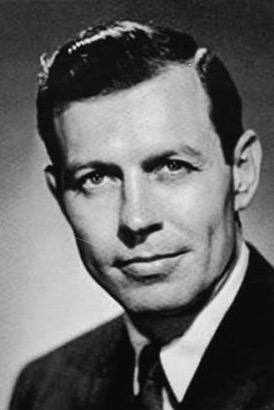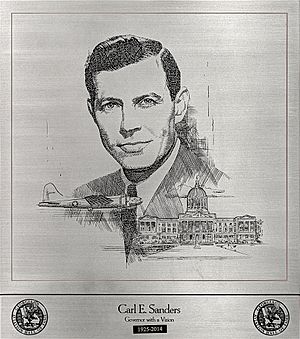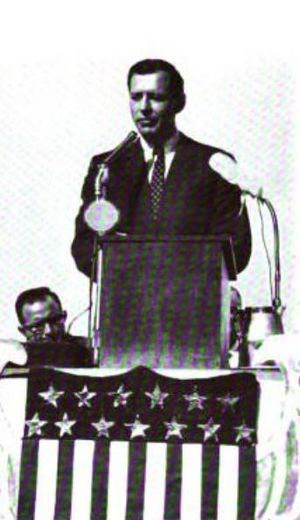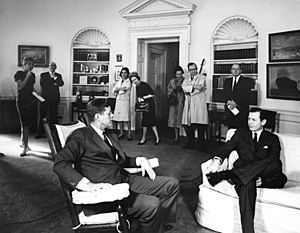Carl Sanders facts for kids
Quick facts for kids
Carl Sanders
|
|
|---|---|
 |
|
| 74th Governor of Georgia | |
| In office January 14, 1963 – January 10, 1967 |
|
| Lieutenant | Peter Zack Geer |
| Preceded by | Ernest Vandiver |
| Succeeded by | Lester Maddox |
| Member of the Georgia Senate | |
| In office 1956–1962 |
|
| Member of the Georgia House of Representatives | |
| In office 1954–1956 |
|
| Personal details | |
| Born |
Carl Edward Sanders
May 15, 1925 Augusta, Georgia, U.S. |
| Died | November 16, 2014 (aged 89) Atlanta, Georgia, U.S. |
| Resting place | Westover Memorial Park, Augusta, Georgia, U.S. |
| Political party | Democratic |
| Spouse | Betty Bird Foy |
| Alma mater | University of Georgia |
| Military service | |
| Allegiance | |
| Branch/service | United States Army |
| Years of service | 1943–1945 |
| Unit | U.S. Army Air Corps |
| Battles/wars | World War II |
Carl Edward Sanders Sr. (May 15, 1925 – November 16, 2014) was an American lawyer and politician. He served as the 74th Governor of the state of Georgia from 1963 to 1967.
Contents
Early Life and Education
Carl Sanders was born on May 15, 1925, in Augusta, Georgia. He grew up in a middle-class family and had a very happy childhood. He attended the Academy of Richmond County. There, he was a good student and played on the school's football team.
In 1942, Carl Sanders went to the University of Georgia on a football scholarship. He played as a left-handed quarterback for the freshman team. In 1943, during World War II, he left college to join the United States Army Air Forces. He became a lieutenant and flew B-17 Flying Fortress planes. He named his bomber "Georgia Peach." He was never sent to fight overseas.
After the war, he returned to the University of Georgia to finish his studies. He studied law and passed his bar exam in 1947. He also played for the Georgia Bulldogs and went to the Oil Bowl. In September 1947, he married Betty Foy, an art student he met at the university. They had two children. Carl Sanders started his own law practice in Augusta.
Political Career in Georgia
Carl Sanders became interested in politics because his father was involved in local government.
Serving in the State Legislature
In 1954, Carl Sanders won a seat in the Georgia House of Representatives. Two years later, he was elected to the Georgia State Senate. He was re-elected in 1958 and 1960. This made him the only person to serve three terms in a row from a multi-county area at that time.
In 1958, Sanders led a Senate committee. This committee looked into how the Rural Roads Authority was spending money. The committee found that the agency spent too much and didn't maintain roads well. They suggested changes to improve road projects.
Lieutenant Governor Ernest Vandiver became friends with Sanders. In 1959, Vandiver made Sanders the Senate floor leader. When Vandiver became governor, a judge ordered schools in Atlanta to allow all races. Sanders was one of the few who advised allowing this, fearing that closing schools would harm students. Vandiver eventually closed schools only temporarily. With the governor's support, Sanders became the president pro tempore of the Senate from 1960 to 1962.
Governor of Georgia
Carl Sanders decided to run for governor in 1962.
1962 Election Campaign
When Sanders started his campaign, Georgia used a special voting system. This system made it hard for candidates from cities to win. But then, federal courts said this system was unfair. So, the election was decided by the total number of votes.
Sanders promised to make Georgia better. He wanted to improve schools, fix the state's highway department, and help mental health and prison systems. He also wanted to bring more businesses to Georgia.
He ran against former governor Marvin Griffin. Griffin strongly supported racial segregation. He said Sanders was too young and not strong enough on segregation. Sanders also supported segregation but believed it was important to follow federal orders. He promised to keep public schools open, even if they had to integrate. Sanders won the primary election and then the general election. He became governor on January 14, 1963. At 37, he was the youngest governor in the country.
What Governor Sanders Did
Governor Sanders created a special group to make government more efficient. This group helped improve prisons, mental healthcare, and state departments like highways and education. He also worked with Atlanta Mayor Ivan Allen Jr. to bring professional sports teams to Atlanta. In 1963, he helped create the Atlanta Falcons football team.
Sanders was seen as a moderate on racial issues. He wanted to avoid violence and keep Georgia's economy strong. He said, "while I am governor we are going to obey the laws, we are not going to resist federal court orders with violence, and we are not going to close any schools." He appointed some African Americans to state boards and to the State Patrol and Georgia National Guard. He tried to find peaceful solutions when racial problems came up. He also spoke to Congress about the Civil Rights Act of 1964.
Working with Lawmakers
As governor, Sanders had a lot of power over the state legislature. He was one of the last governors to have so much influence. In 1963, Leroy Johnson became the first African American state senator in Georgia in many years. When guards at the State Capitol tried to enforce "white" and "colored" signs, Sanders had the signs removed. He also helped Senator Johnson get service at a private club that had refused him.
Sanders was careful with state money. He focused a lot on public education. In 1963, his budget suggested that 56% of state spending go to education. He also created a commission to improve education. This group included the first African Americans appointed to a state commission since the Reconstruction era.
In 1964, he called for more money for schools, suggesting tax increases on liquor and beer. He also wanted the State Board of Education to set minimum standards for schools. During his time as governor, teacher salaries went up, 10,000 more teachers were hired, and many new schools were built. New junior colleges and vocational schools were also created.
Sanders also asked for money to build airports. Between 1965 and 1966, 33 new community airports were built in Georgia. The state's economy did very well while he was governor. Georgia even had extra money when he left office.
Sanders supported creating a new state constitution in 1963. However, a court stopped it because the districts of the lawmakers who created it were unfair. This disappointed Sanders. Later, the United States Supreme Court said Georgia had to redraw its congressional districts to make them fair. Sanders pushed the legislature to make these changes quickly.
Political Connections
After winning the election, Sanders met with President John F. Kennedy. He generally supported Kennedy's plans for the country.
In 1964, Sanders chose a diverse group to represent Georgia at the 1964 Democratic National Convention. This was the first time African Americans were part of Georgia's group. Sanders explained that it was important for every voter to be represented.
Sanders could not run for re-election in 1966 because of term limits. He supported Lester Maddox, a segregationist, to be his successor, even though they disagreed on many things. Sanders left office on January 10, 1967.
1970 Governor Campaign
After leaving office, Sanders was very popular. He turned down offers for jobs in the federal government. Instead, he ran for governor again in 1970. He was expected to win.
Another candidate, Jimmy Carter, tried to make Sanders seem out of touch. Carter called him "Cuff Links Carl" and suggested Sanders was only for "big-money boys." Sanders' ads showed him jogging and flying, while Carter's ads focused on his farming background.
In the first primary election, Carter got the most votes, and Sanders came in second. Since no one won a clear majority, they had a runoff election. Sanders attacked Carter, calling him a "smiling hypocrite." Carter refused to debate, so Sanders held a televised "debate" with an empty chair. Carter won the runoff election.
Sanders was upset about the 1970 campaign. He never ran for public office again, but he continued to help raise money for Democratic candidates.
Later Life and Legacy

In 1967, Carl Sanders started a law firm in Atlanta called Troutman, Sanders, Lockerman & Ashmore. He focused on his law firm after his 1970 election loss. He became chairman of First Georgia Bank in 1973. He was chairman of his law firm for 30 years. When he passed away, the firm had grown to include 600 lawyers. Carl Sanders died in Atlanta on November 16, 2014, at age 89, after a fall at his home.
In 1997, he was added to the Georgia Aviation Hall of Fame. This was to recognize his efforts in building and expanding airports in Georgia. The Carl E. Sanders Family YMCA opened in Buckhead, Atlanta, in 2000, after a gift was made in his honor.
Images for kids
 | James Van Der Zee |
 | Alma Thomas |
 | Ellis Wilson |
 | Margaret Taylor-Burroughs |




